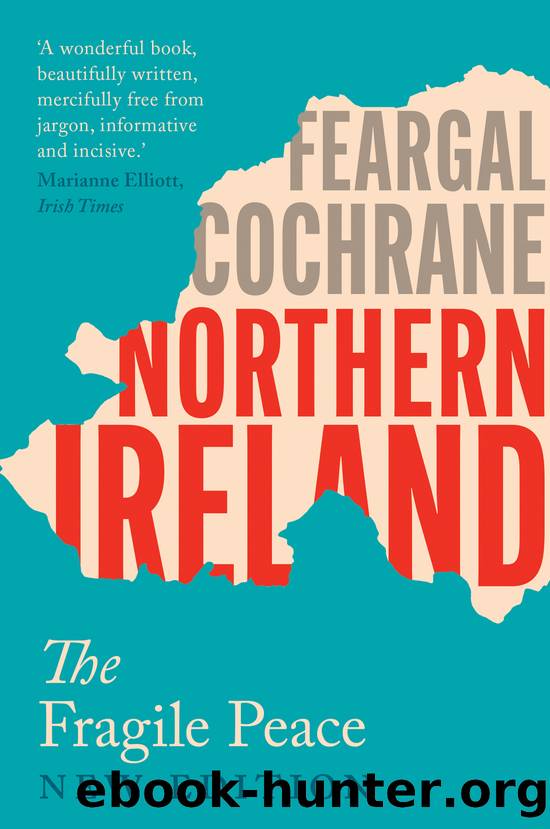Northern Ireland by Feargal Cochrane

Author:Feargal Cochrane
Language: eng
Format: epub
ISBN: 9780300205527
Publisher: Yale University Press
Yes, he is an international moral icon, but he is also the worldâs best example of a former paramilitary turned political and national leader â and all without decommissioning .â.â. It will be used by our opponents against us to hammer away at the key issues of prisoner release, paramilitaries in government and decommissioning.14
After a heated and emotional campaign, the referendums eventually produced an overwhelming mandate for the Good Friday Agreement across the island of Ireland. In the North, 71 per cent of the electorate voted âYesâ to the question âDo you support the Agreement reached in the Multi-Party Talksâ, while only 29 per cent voted âNoâ. The turnout was 81 per cent, the highest ever in the history of the âstateâ. The numbers in the Irish Republic were even more impressive, with an overwhelming 95 per cent of people voting in favour of the Agreement and reform of Articles 2 and 3 of the constitution, though the turnout was much lower, at 55 per cent. The raw numbers were equally impressive: 2,119,549 voters across the island of Ireland voted âYesâ, and only 360,627 âNoâ.15 Interpreting the numbers on an all-island basis is, of course, a bit of âcreative accountingâ, as it was the consent of people within Northern Ireland that really mattered in terms of its future survival.
Whichever way the figures were tallied up, it was (initially at least) a triumph for the pro-Agreement supporters and a defeat for the No campaign. The turnout was massive and the overall majority in support of the GFA was healthy and robust. The episode illustrated once again, however, the inability of the political elites to win the trust of the electorate without the assistance of more informal, community-based initiatives. The independent Yes Campaign played a significant part in securing the positive result. It was much more media savvy than the political parties and it used networks from across civil society to create the sense of a shared agenda in support of a peaceful future â networks that were not available to those within the formal political process. Proving cause and effect is extremely difficult, of course, but it is reasonable to conclude that, had the informal political activism of the Yes Campaign not supplemented the efforts of the political parties, rather less than 71 per cent would have voted in favour of the GFA.
I voted âyesâ in the referendum. While I was aware of all the imperfections of the GFA, I felt that this was a crucial moment in Northern Irelandâs political history and a crucial moment for the island of Ireland itself â perhaps the most crucial there would be in my lifetime: electoral participation by the wider community would have a direct material effect. Normal elections come and go, but this was different; and for me, a âyesâ vote meant a future for my family and friends, while a ânoâ vote signalled a return to the past.
I was aware by this point that I would soon be leaving Northern Ireland for an academic job in Britain, which made the experience all the more poignant.
Download
This site does not store any files on its server. We only index and link to content provided by other sites. Please contact the content providers to delete copyright contents if any and email us, we'll remove relevant links or contents immediately.
Magic and Divination in Early Islam by Emilie Savage-Smith;(1196)
Ambition and Desire: The Dangerous Life of Josephine Bonaparte by Kate Williams(1087)
Operation Vengeance: The Astonishing Aerial Ambush That Changed World War II by Dan Hampton(986)
What Really Happened: The Death of Hitler by Robert J. Hutchinson(870)
London in the Twentieth Century by Jerry White(848)
Time of the Magicians by Wolfram Eilenberger(844)
Twilight of the Gods by Ian W. Toll(813)
The Japanese by Christopher Harding(799)
Papillon by Henry Charrière(796)
Lenin: A Biography by Robert Service(780)
The Devil You Know by Charles M. Blow(779)
Twelve Caesars by Mary Beard(768)
Freemasons for Dummies by Hodapp Christopher;(749)
The Churchill Complex by Ian Buruma(731)
Napolean Hill Collection by Napoleon Hill(705)
The Enlightenment by Ritchie Robertson(693)
Henry III by David Carpenter;(690)
Bohemians, Bootleggers, Flappers, and Swells: The Best of Early Vanity Fair by Bohemians Bootleggers Flappers & Swells- The Best of Early Vanity Fair (epub)(687)
The Rise and Triumph of the Modern Self by Unknown(659)
